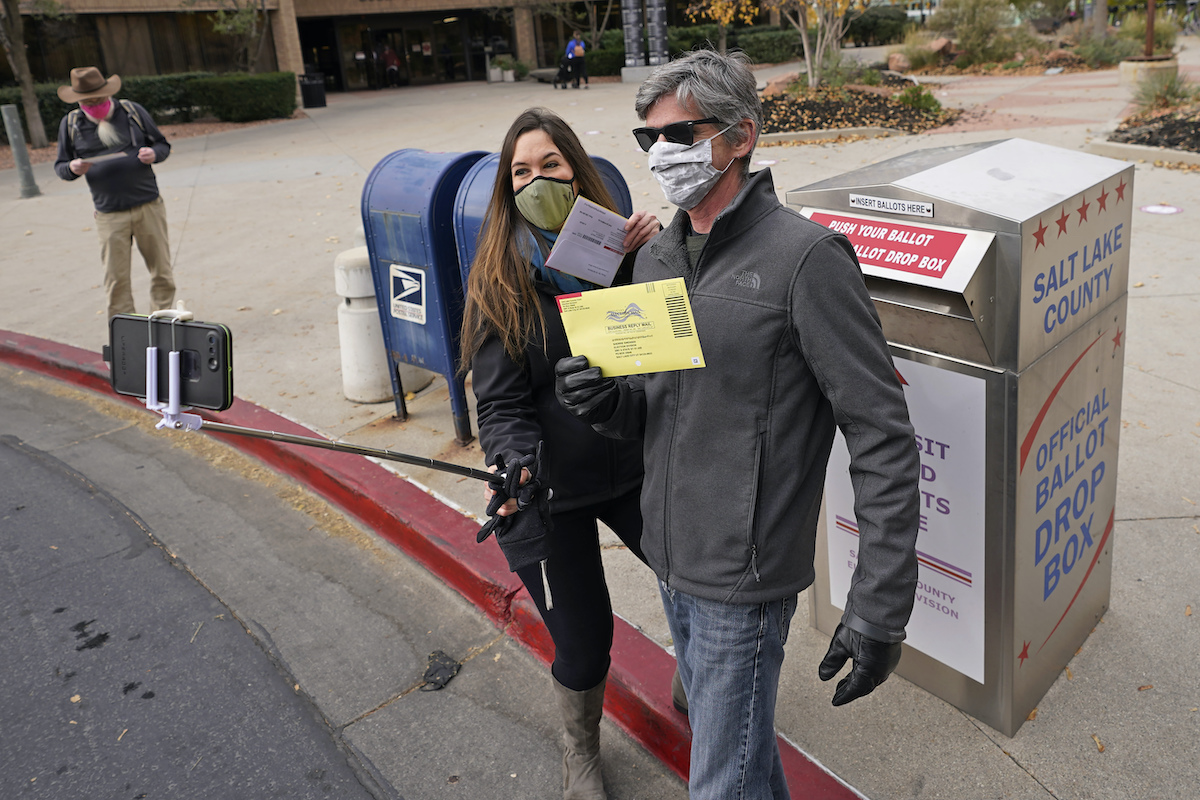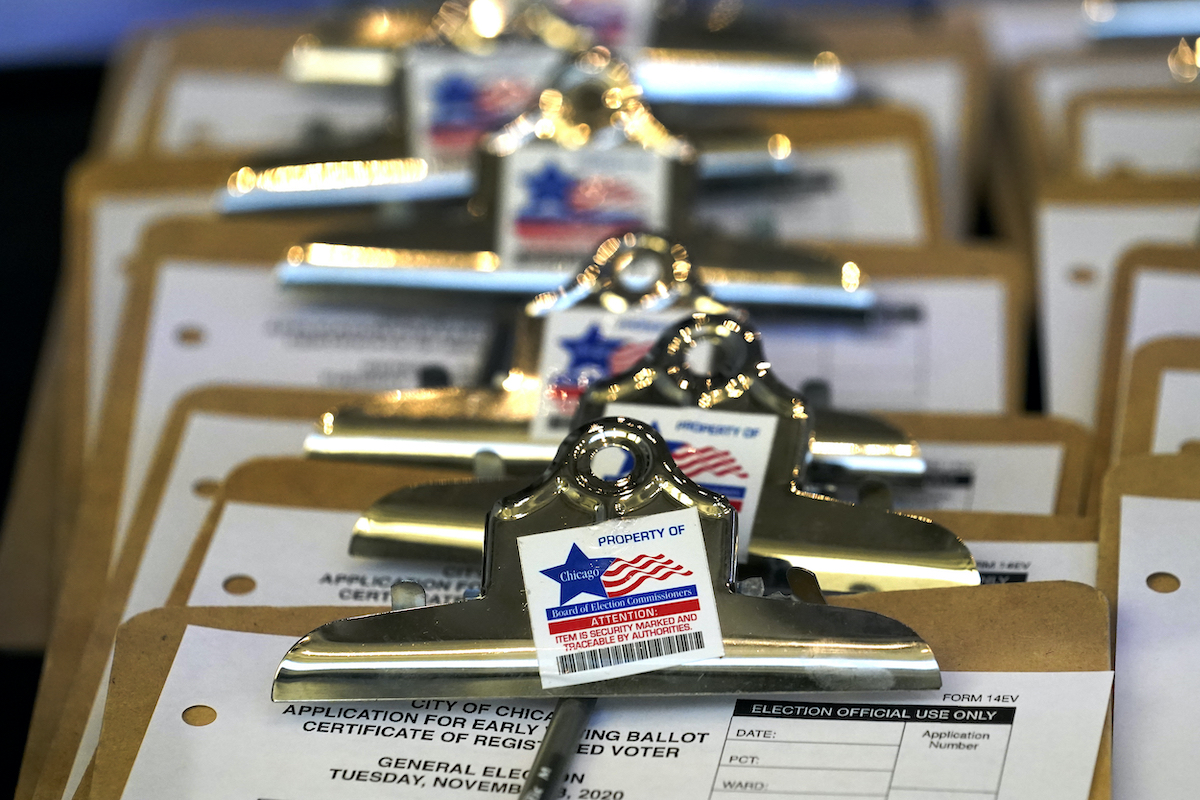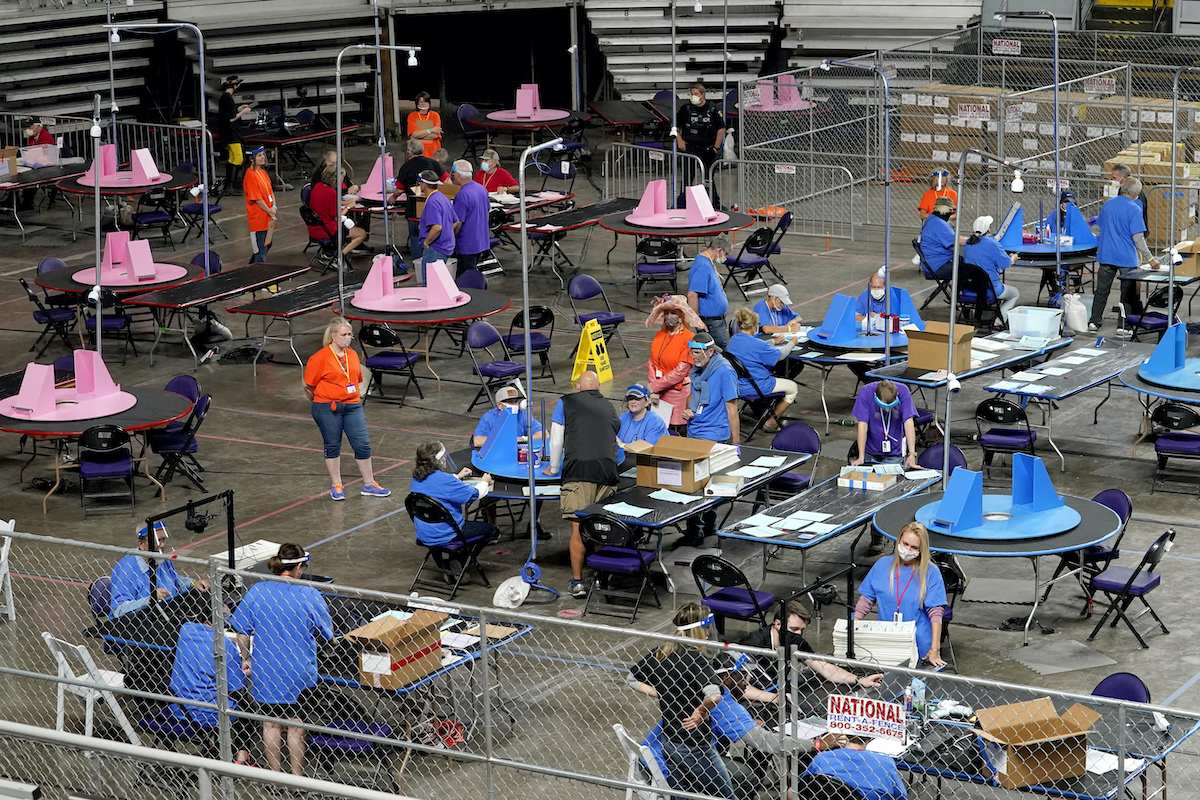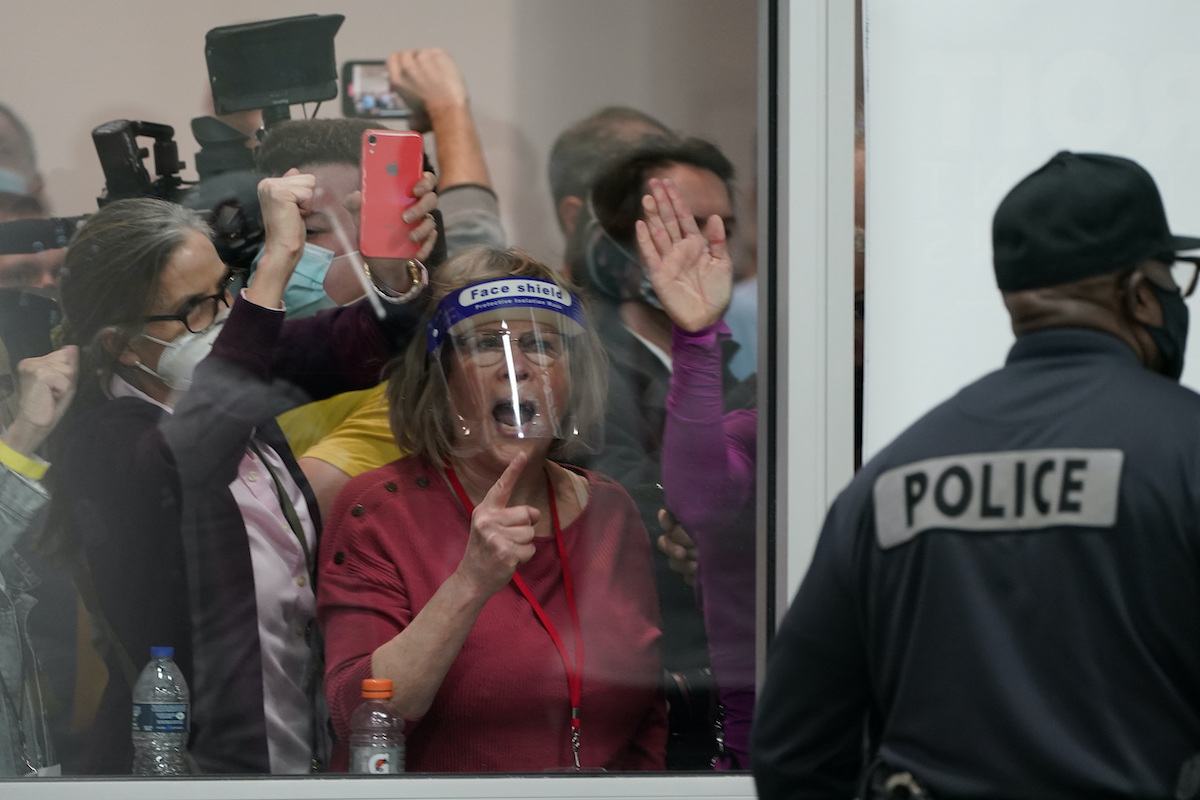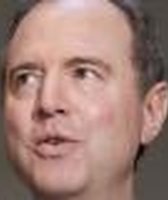Stand up for the facts!
Our only agenda is to publish the truth so you can be an informed participant in democracy.
We need your help.
I would like to contribute
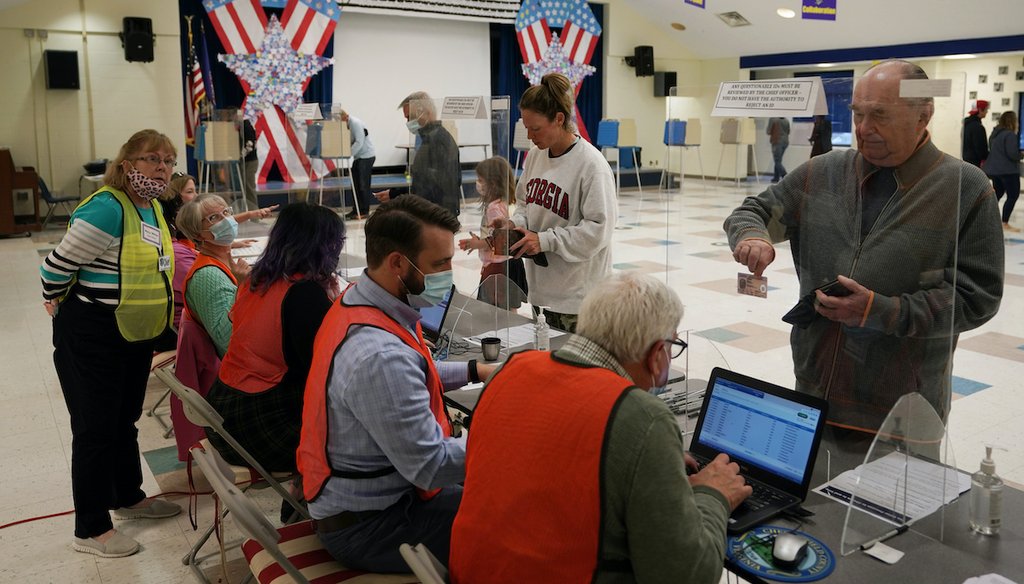
Voters wait in line to check in to vote at a school in Midlothian, Va., Nov. 2, 2021. (AP)
When a journalist is covering the process of voting – whether it’s for mayor, governor or U.S. Senator – the goal is the same: show the public the truth about the administration of elections. Accurate reporting about elections helps reduce the spread of unfounded rumors.
Journalists and their newsrooms should prepare now to cover primaries and the Nov. 8 election, said Mickey Osterreicher, general counsel for the National Press Photographers Association.
A key piece of advice: Review state election laws ahead of time, "and don't assume anything," Osterreicher said.
If your newsroom has an attorney, now is the time to ask if that person can speak to election reporters and photographers about laws they need to know. In the meantime, here are answers to a few basic questions that journalists might have.
Sign up for PolitiFact texts
Generally states have electioneering laws that establish neutral zones, generally within 30 to 200 feet of election sites, to protect voters from people trying to influence their vote. Whether those laws apply to journalists can vary.
Journalists should have a conversation with local election officials and ask in advance what they are and aren’t allowed to photograph at voting sites, or how close they can get in order to interview voters. Some elections offices have put rules in writing, such as Los Angeles County and North Carolina.
In Michigan, the media are allowed up to the threshold of the polling location, which means they can’t enter the specific room where voting is taking place.
"There is not a strict definition; it is based on where the polling location is," said Tracy Wimmer, a spokesperson for Michigan’s secretary of state. "For example, if it’s in a school gymnasium, they could enter the school, but not the gymnasium itself."
The Wisconsin Elections Commission said that journalists should check in with the official in charge at each voting location. Journalists can photograph and shoot video at election sites as long as they don’t show how someone voted, while interviews should take place outside the voting area.
Voters themselves aren’t necessarily allowed to photograph their own ballots. It depends on where they live. Some states have passed laws expressly allowing ballot selfies, while other states have passed laws that restrict selfies.
Courts have issued mixed rulings about giving journalists access to voting sites, according to the Reporters Committee for Freedom of the Press.
In an Ohio case, the U.S. Court of Appeals for the Sixth Circuit in 2004 ruled that the secretary of state must allow journalists "reasonable" access to any polling place for the purpose of news-gathering and reporting, as long as journalists don’t interfere with poll workers or the right of voters to cast ballots.
How to define "reasonable"? The Ohio Secretary of State told local officials to consider factors such as whether the journalist is credentialed, as well "the effect of the presence of the media (has) on voters and election officials."
Some rulings have not been in favor of media access. A 2013 ruling from the U.S. Court of Appeals affirmed a Pennsylvania law that required journalists to remain 10 feet away from polling places.
The Reporters Committee for Freedom of the Press found that in 2020 battleground states, voter registration records were open to public inspection. But the access isn’t total: some information such as Social Security numbers may be blocked, while some states charge for access.
Information in voter rolls often includes a voter’s address, voting history and party affiliation.
In some states, ballots are considered public records. In Florida, media outlets successfully sued in 2000 to access ballots amid the presidential recount. In other states, ballots are private records.
The press is entitled to observe ballot counts and recounts in most of the battleground states.
State laws exist that generally allow journalists to watch government-run election audits and may include rules about how close reporters can observe the process.
But after the 2020 election, Arizona journalists found themselves in unfamiliar legal territory when Republican state senators launched a review of 2 million ballots in Maricopa County. Organizers tried to block reporters’ access, saying they could only watch if they signed up as observers.
David Bodney, an Arizona media lawyer, negotiated on behalf of the Arizona Republic, Arizona Mirror and the state broadcasters association to reach an agreement for pooled access in a section of the Veterans Memorial Coliseum.
Journalists still faced challenges, though. Arizona Republic reporter Ryan Randazzo was kicked out of the coliseum after he tweeted a photo of a former Republican lawmaker at a ballot-counting table. Randazzo’s editor said the removal was unjustified because the newspaper had followed the terms of the agreement, including not showing details on ballots.
Randazzo told us he called his editor and was told to leave quietly. After his editor reached out to officials with the state senate, the matter was quickly resolved. Randazzo told us that he was allowed to return to the coliseum the next time that he had a shift as part of the press pool.
Bodney said journalists should build coalitions with other journalists, follow the law, communicate with editors about any official roadblocks and remain diligent in fighting for access. He also advises that journalists avoid being drawn into political contests.
"The right of access is not about politics – it's about news gathering and informing the public," Bodney said. "Avoid the temptation to be drawn into any kind of personalized partisan fight. Stay safe, stay smart, and remain respectful."
In 2020, journalists covered protests at vote-counting centers where some participants were armed. The next year, they covered the violent Jan. 6 attack on the U.S. Capitol.
Poynter has prepared a list of 25 guidelines for journalists to safely cover unrest with the goal of getting close enough to cover the story without getting hurt or interfering with security. Here are some of the guidelines:
-
Clearly identify yourself and have credentials easily available. But think carefully about whether you display credentials openly when surrounded by demonstrators. Do not have credentials on a lanyard around your neck because it can be used to strangle you.
-
Have a constantly updated escape route in mind.
-
Carry a grab bag with a small first aid kit, water bottle, high-protein snacks, washcloth, eye protection, respirator mask, flashlight, and a copy of your ID or press card.
-
If police ask to search or seize your equipment, you do not have to consent. The Fourth Amendment protects you from unreasonable searches and seizures, and the Privacy Protection Act of 1980 restricts law enforcement from searching for and seizing a journalist’s work product and documentary materials. Rehearse your response in advance. You can say something like "I’m a journalist, and my equipment and its contents belong to my company. If you want to access it, you will first need to contact their attorney."
-
Safety first, story second. When you take undue risks, you endanger those who might have to rescue you.
RELATED: Ask PolitiFact: What steps do election officials take to prevent fraud?
RELATED: Ask PolitiFact: How are elections run in the US?
Our Sources
Reporters Committee for Freedom of the Press, Election legal guide, 2020
Committee to Protect Journalists, Safely covering U.S. election events and Guide to Legal Rights in the U.S. 2020
The Journalist’s Resource, 8 tips for covering U.S. elections from a former elections administrator, July 18, 2018
Sarah Scire, The election could be contested and last for weeks after Nov. 3. Here’s what experts think journalists should know, NiemanLab, Sept. 29, 2020
National Task Force on Election Crises, What happened in the 2020 election and what comes next, Accessed April 2022
Democracy Fund, Voter study group, Accessed May 13, 2022
National Conference of State Legislatures, Electioneering prohibitions, April 1, 2021
Jeremy Duda, Arizona GOP won’t commit to letting reporters cover election 'audit' April 22, 2021
North Carolina State Board of Elections, State Board Releases Press Kit, Guidance for Reporters Covering Election, Oct. 13, 2020
Arizona Republic, Arizona GOP lawmakers hold meeting on election outcome with Trump lawyer Rudy Giuliani, Nov. 30, 2020
Arizona Republic, The Republic takes Cyber Ninjas, Senate to court for audit records, July 2, 2021
Michigan Department of State, Michigan election law and election administrator information, Accessed April 2022
National Conference of State Legislatures, Election resources, Jan. 5, 2022
Election Sos, Reporting Insights from an Election Administrator, 2020
Arizona Mirror, The Arizona Senate has spent $500,000 to block access to ‘audit’ public records, May 5, 2022
Telephone interview, Mickey Osterreicher, general counsel for the National Press Photographers Association, April 28, 2022
Telephone interview, Mike Sanchez, Los Angeles County elections spokesperson, April 28, 2022
Email interview, Sophia Solis, Arizona Secretary of State Katie Hobbs spokesperson, April 28, 2022
Telephone interview, David Bodney, Arizona media lawyer, April 28, 2022
Telephone interview, Ryan Randazzo, Arizona Republic reporter, April 29, 2022
Email interview, Tammy Patrick, senior adviser for the Democracy Fund, May 4, 2022
Email interview, Riley Vetterkind, Wisconsin Elections Commission spokesperson, May 2, 2022
Email interview, Tracy Wimmer, spokesperson for Michigan Secretary of State Jocelyn Benson, April 29, 2022

